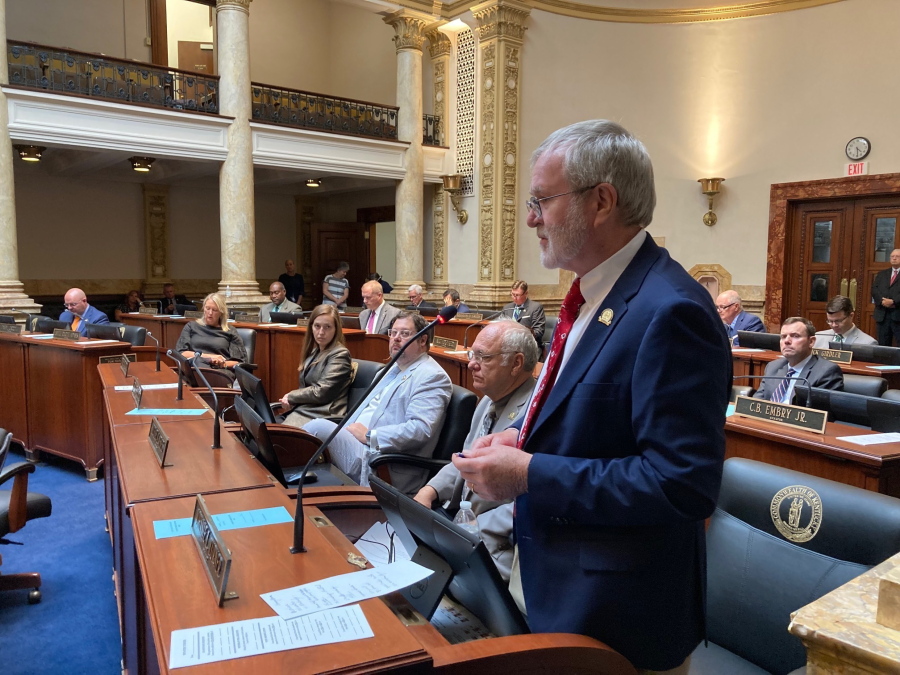FRANKFORT, Ky. — Kentucky lawmakers on Friday passed a nearly $213 million aid package for flood-ravaged Appalachia, wrapping up a special session responding to the mammoth challenge of recovery — underscored by chilling accounts of devastation and tragedy.
The House voted 97-0 to send the sweeping state relief package to the Senate, which gave final passage a short time later. The measure was quickly signed into law by Democratic Gov. Andy Beshear, who had called the Republican-dominated legislature back into session.
The bipartisan measure will pump money into devastated communities in eastern Kentucky to help repair or rebuild roads, bridges, water systems, schools and other public buildings. It includes money to provide intermediate housing for people left homeless by the raging floodwaters.
“Since the very beginning, this has been one of the greatest examples I’ve seen of nonpartisanship — of just simply caring for your fellow human being and living out our shared faith and values,” the governor said at the bill-signing ceremony, capping the three-day session.
The relief measure was portrayed as an initial installment of state aid for a region already struggling from the decline of the coal industry. Lawmakers said they’ll assess the region’s ongoing needs in preparation for follow-up assistance next year when they’re back in session.
“This is the first step,” said Republican state Rep. John Blanton, who represents an area hard hit by the floodwaters. “We’ve got to come back and we’ve got to see what the needs are.”
The legislative action comes about a month after historic flooding destroyed homes and businesses and caused significant damage to schools, roads, bridges and water systems. The disaster caused at least 39 deaths and robbed thousands of families of all of their possessions.
Lawmakers from the region put the heartbreak from the disaster into focus Friday — and the strain it’s put on the budgets of local governments.
Republican Rep. Chris Fugate said 2,800 people in his hard-hit district lost their homes, including people who had lived in the same place for 60 or 70 years. He described scenes of “people standing beside the road and just looking at what used to be their homes — that were gone.”
In Floyd County, the fiscal court has spent more than $1.5 million on emergency repairs to roads, culverts and other infrastructure since the flooding, and those costs are expected to mount, said Democratic Rep. Ashley Tackett Laferty. The county’s annual road fund is typically about $2 million.
The relief fund will draw $200 million from the state’s $2.7 billion Budget Reserve Trust Fund.
The biggest chunk of aid — $115 million — will provide support to cities, counties, school districts, state agencies and utility service providers. Another $45 million will help repair and replace bridges and roads. And $40 million will be used for repairs to school buildings, for additional transportation costs for displaced students and services for children and families.
Nearly $12.7 million in federal funds will be used for water and sewer infrastructure projects.
The influx of state assistance — coupled with federal aid and private donations — is seen as crucial to rebuilding from the wreckage, lawmakers from the beleaguered region said.
“This can be the disaster that ended us,” said Democratic Rep. Angie Hatton. “Or it can be a catalyst for real change to make eastern Kentucky an easier place to live.”
The measure stipulates that financial support from the relief fund will not cover any new construction inside the 100-year flood plain.
Republican Sen. Brandon Smith, also from eastern Kentucky, tried unsuccessfully to have an extra $50 million allocated for housing assistance, with the money coming from the budget reserve fund.
The flood has left thousands of people living in badly damaged houses, many tarped over to keep out the rain, he said. Others are sleeping in tents.
“We are getting ready to see a crisis that will be historic across Appalachia,” Smith said.
The measure’s leading supporters said the bill includes significant temporary housing assistance. And they expressed concern that Smith’s proposal would have threatened the ability to maximize assistance from the federal government. The governor said the influx of travel trailers is ramping up to provide intermediate housing for people displaced by the flood.
It’s the second time within a year that Kentucky lawmakers have taken up emergency relief stemming from an epic weather disaster. Earlier this year, lawmakers passed a $200 million aid package for portions of western Kentucky devastated by tornadoes in December.
Like the tornado disaster, the catastrophic flooding prompted an outpouring of donations and support from across the country.
“It actually restored my faith in humanity, the last month,” Fugate said. “Because so many times we look at the negative and that’s all we hear is the negative. But I’m thankful that there are still people who care about each other.”




